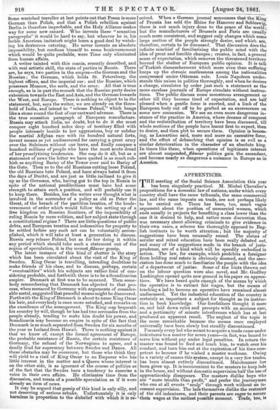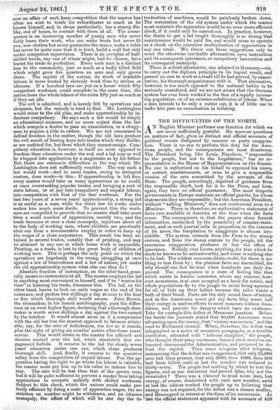APPRENTICES.
THE meeting of the Social Science Association this year has been singularly practical. M. Michel Chevalier's propositions for a domestic law of nations, under which every country shall have the same tribunals, the same commercial law, and the same imposts on trade, are not perhaps likely to be carried out. There has been, too, much vague argument about the position of unmarried women, which ends usually in projects for benefiting a class lower than the one it is desired to help, and rather more discussion than was necessary about allowing criminals to give evidence in their own cases, a scheme too thoroughly opposed to Eng- lish instincts to be worth attention ; but the majority of suggestions have been unusually sound. The claims of secular and mixed education have been really debated out, and many of the suggestions made in the branch of juris- prudence, are of a kind which will be speedily embodied in action. The law, for example, which prohibits a foreigner from holding real estate is obviously doomed, and the asso- ciation has done much to familiarize the people with the idea of a department of justice. Some of the hints thrown out on the labour question were also novel, and Mr. Godfrey Lushington opened quite new ground in his paper on appren- tices. We have heard quite enough of the means by which the operative is to extract fair wages, but the means of teaching a lad to become an operative have remained almost undiscussed. Yet the industrial education of the country is certainly as important a subject for thought as its instruc- tion in book knowledge. Our forefathers thought it more so, and laid down rules and precepts with an anxious care, and a pertinacity of minute interference which has at last produced an apparent recoil. The neglect of the topic is the more remarkable because the means once employed universally have been slowly but steadily discontinued. Formerly every lad who meant to acquire a trade came under indentures to a master for seven years—in fact, was bound to serve him without pay under legal penalties. In return the master was bound to feed and teach him, to watch over his conduct, and turn him out at the expiration of his time com- petent to become if he wished a master workman. Owing to a variety of causes this system, except in a very few trades, has been almost entirely discontinued. Maintenance has been given up. It is inconvenient to the masters to keep lads in the house, and without domestic supervision half the use of apprenticeship disappears. The masters dislike boys who are "more trouble than profit," and prefer the journeyman who can at all events "scalp" through work without an in- cessant supervision. The lads themselves dislike the restraint of the old indentures, and their parents are eager to secure theirwages at the earliest possible moment. Trade, too, is now an affair of such keen competition that the master has often no wish to teach his subordinates as much as he knows himself, and, in shops particularly, has a strong dis- like, out of hours, to contact with them at all. The conse-' quence is an increasing number of young men who never fairly learn their work, who can make boots but never fit you, sow clothes but never guarantee the seams, make a table but never be quite sure that it is level, build a wall but only under competent supervision. There is an overplus of half- skilled hands, any one of -whom might, had be chosen, have learnt his trade to perfection. Every such man is a distinct loss to the community, just as much as a badly tilled field which might grow five quarters an acre and only grows three. The capital of the nation, its stock of available labour, is more wasted by slovenly work than by strikes or idleness. If a hundred men are put on a house which fifty competent workmen could complete in the same time, the nation loses the whole labour of the extra fifty just as much as if they sat idle. The evil is admitted, and is keenly felt by operatives and shopmen, but the remedy is hard to find. Mr. Lushington would recur to the old plan, and make apprenticeship by in- denture compulsory. He says such a law would be simply an educational measure, and no more unjust than the law which compels a doctor to pass an examination, or a clergy- man to acquire a title to orders. We are not concerned to defend freedom in the matter, though the old laws produce the evil result of forcing boys into trades which they dislike, or are unfitted for, but from which they cannot escape. Com- pulsory education is, however, in itself no more opposed to freedom than education under the rod, and a lad may as well be whipped into application by a magistrate as by his father. But there are economic difficulties in the way which Mr. Lushington does not sufficiently consider. The way such a law would work—And in some trades, owing to stringent custom, does work.-is this : If apprenticeship is left free, every master would take as many apprentices as he could, at once overstocking popular trades, and bringing a sort of slave labour, or at any rate compulsory and unpaid labour, into competition with that of the free workman. For the last two years of a seven years' apprenticeship, a strong lad is as useful as a man, while the strict law he works under makes him much more docile. To prevent this the work- men are compelled to provide that no master shall take more than a small number of apprentices, usually two, and the trade becomes at once a close monopoly, injurious above all to the body of working men, whose children are practically shut out from a remunerative employ in order to keep up the wages of a close corporation. ' This result has been at- tained in several trades, notably that of printing, and may be attained in any one in which home work is impossible. Printing, as a trade, is lost to the great body of children of working men. This is perhaps the only point on which the operatives are hopelessly in the wrong, struggling at once against a law of benevolence and a law of nature, yet under the old apprenticeship system what else can they do ? Absolute freedom of instruction, on the other hand, gene- rally means no instruction at all. The master employs the lad in anything most convenient to himself, and if he " wastes his time" in learning his trade, dismisses him. The lad, on the other hand, learns to look on early wages as the end of his existence, and prefers two shillings a day at once to the four or five which thorough skill would secure. John Brown, the shoemaker, in his recent autobiography, puts the differ- ence at an even higher figure, declaring that a thorough shoe- maker is worth seven shillings a day against the two earned by the botcher. It would almost seem as if a compromise with the old law was the nearest approach to fairness attain- able, say, for the sake of definiteness, the law as it stands, plus the right of giving six months' notice after three years' service. This would retain to the master the efficient and decisive control over the lad, which absolutely free en- gagement forbids. It secures to the lad the steady seven years' education under one eye, which alone produces thorough skill. And, finally, it ensures to the operative safety from the competition of unpaid labour. For, the ap- prentice having the right to go where his labour is valuable, the master must pay him up to his value to induce him to stay. The rate will be less than that of the grown man, but it will be quite sufficient to prevent a master from taking apprentices to compete unfairly with skilled workmen. Subject to this check, which the • unions could make per- fectly efficient by fixing a scale of apprentice wages, the re- striction on number might be withdrawn, and an irksome monopoly, the effect of which will be one day the in- troduction of machines, would be painlessly broken down. The restoration of the old system under which the master must maintain the apprentice would be an even more efficient check, if it could only be carried out. In practice, however, the desire to get a lad taught thoroughly is so strong that maintenance would be paid for, and would cease to operate as a check on the excessive multiplication of apprentices in any one trade. We throw out these suggestions only to meet the otherwise inevitable alternatives, open instruction and its consequent ignorance, or compulsory instruction and its consequent monopoly. There is a third alternative, one adopted in Germany—vi z . to carry out the diploma principle to its logical result, and permit no one to work at a trade till he had proved, by exami- nation, his thorough acquaintance with it. That alternative however, is too much opposed to the national habits to be seriously considered, and we are not aware that the German system has ever been worked in the face of a rapidly increas- ing population, or of an extreme subdivision of labour. When a man intends to be only a cutter out, it is of little use to make him pass an examination in tailoring.































 Previous page
Previous page